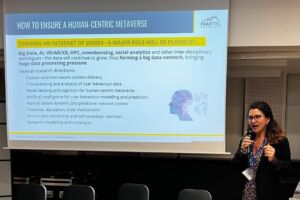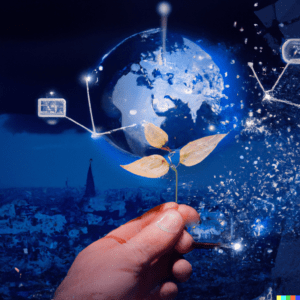From November 21 to 23, 2022, Digital for Planet attended the European Big Data Value Forum (EBDVF), the flagship event of the European Big Data Value and Data-Driven AI Research and Innovation community.
This year’s edition was especially exciting for Digital for Planet because it marked the official announcement of our partnership with BDVA. It has also provided an opportunity to meet industry professionals, business developers, researchers, and policymakers from across Europe to discuss sustainability in Data and AI research and applications. Learn more about the leading topics and R&I projects that are paving the way for a more sustainable Europe.

Big Data, AI, as well as AI, VR/AR/XR, HPC, crowdsensing, and social analytics are playing a major role in building the metaverse. The metaverse will lead us toward an Internet of senses at the crossroads of the physical and digital worlds, fed by the increasing growth of data, forming a big data network and bringing massive data processing pressure. This will require powerful data centers, but their carbon footprint is unknown. As our President and Founder, Dr Monique Calisti, highlighted in the panel session The metaverse – current status and way forward, there are several research directions addressed within the metaverse’s construction, and it is critical that the empowerment of people and the protection of our planet are at the core of all of them. Check her full presentation here.
Digital Twin/AI and Big Data-based simulation technologies are essential not only for overcoming and mitigating climate change emergencies but also for managing processes and resources more efficiently across a wide range of sectors. From manufacturing to the blue economy, from agrifood to biodiversity, several EU-funded projects are combining Digital Twin approaches with Big Data and AI technologies to advance sustainability, such as:
 Digitalisation is proving to be a key enabler in the water sector, allowing it to optimise consumption, improve health and safety, and implement more efficient management strategies. Data and AI technologies are assisting in the development of more resilient and sustainable water services, but several obstacles must still be overcome. Water utilities, for example, require efficient quality monitoring of the water resources they use, not only using actual sensor data but also considering alternatives such as crowd, virtual, and remote sensing (with reference to the use of Copernicus EU data). Nevertheless, managing such a large and heterogeneous volume of data is a real challenge both for private and public authorities.
Digitalisation is proving to be a key enabler in the water sector, allowing it to optimise consumption, improve health and safety, and implement more efficient management strategies. Data and AI technologies are assisting in the development of more resilient and sustainable water services, but several obstacles must still be overcome. Water utilities, for example, require efficient quality monitoring of the water resources they use, not only using actual sensor data but also considering alternatives such as crowd, virtual, and remote sensing (with reference to the use of Copernicus EU data). Nevertheless, managing such a large and heterogeneous volume of data is a real challenge both for private and public authorities.
The European Green Deal Goals and the success of Europe’s green transition depend also on digital innovation and solutions. However, digital process optimisation, physical consumption reduction, connectivity, and access to services are all significant factors to take into account.
The path forward is to bridge the digital transformation and the green transition. Digital technology must not only enable more sustainable actions in specific domains but it must also be targeted for that purpose. When it comes to advancing sustainable ICT, important aspects to consider include a better understanding of its carbon footprint – both during production and usage, as well as post-mortem time -, and its source of energy and consumption. Furthermore, policymakers and all stakeholders along the value chain should work together to develop more resilient business models, targeted investments, regulation, and fiscal incentives, as well as better raise awareness and educate end users on how to use digital technologies more responsibly.
Digital for Planet - D4P © 2025 | All rights reserved